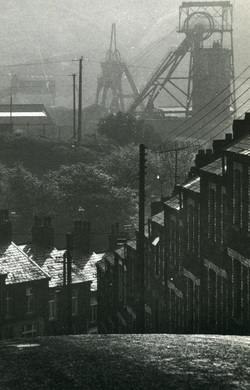 View of colliery, South Wales
View of colliery, South Wales What makes a classic? For me, it is a book which writes of the eternal truths of life in a language that still speaks to the reader's condition, in whatever age it is read; when you're reading, the author's voice is as fresh as if he or she was still sitting round the camp-fire, telling you the story. It's interesting that some of the cutting edge contemporary novels acclaimed by literary judges can seem extremely dated after a very few years.
Germinal was not an easy read. Sticking with the long suffering of its characters was grim, but, apart from my compliant desire to finish the book-club read, I also felt compelled to honour that suffering by giving the story my full attention.
This edition, one of the marvellous Penguin Classics series, has an excellent introduction by the translator, giving the political, social and literary background of the book, but I read it after I'd finished the story, which is my habit, as I prefer to read any book initially as the first readers would have, without later analysis and context. Germinal is the thirteenth novel in Zola's great Rougon-Maquart sequence, and it deals with the exploitation of the mining community who subsist in dire poverty, in Northern France in the 1850s.
I feel as if my world has expanded after reading about the tragic Maheu family, their neighbours and fellow-miners, and the mine-managers and families. Zola draws you into their existence, using their relationships, pains and joys, to illustrate his larger theme of the struggle of the working class.
We have a saying in our house when anyone is moaning about their job: "Well, it's not as bad as being a miner, is it?" This is not looking down on miners, far from it, but a reminder that, whatever fault we can find with our current paid work, it doesn't bear comparison with the extreme physical effort made by miners in often appalling conditions. This was highlighted a couple of years back by the BBC Wales TV reality programme Coal House, which took several families to live in recreated Victorian conditions, where the men and boys went off to work in the mines. The men were shocked by the unrelenting slog of hewing coal and found it hard to believe anyone could keep that up on a diet which was very poor by modern standards. My husband is descended from coal-miners in the Welsh valleys, and his grandfather died of lung-disease contracted in the course of that work.
Of course, there are still miners at work around the world in less than ideal conditions. Occasionally there is an item on the news about miners being killed, in China, in the former USSR, in North America etc. And reading in Germinal of the mine's collapse, I wondered out loud, "What's happened to the Chilean miners?" How quickly we move on from the latest news and return to our preoccupations, but I remember how deeply moved I felt when those men, courageous, supportive of each other, stoical, were rescued after 69 days underground.
Thanks to the benefits of Sir Tim Berners-Lee's generous gift of the world-wide web to humanity, and search-engines, I found a Blog by the Chilean miners, with a very recent posting go about the closing of the case investigating the mine collapse in which they were trapped. I recommend it to anyone interested: http://www.33miners.com
And I intend to read more about miners worldwide. Perhaps I might first revisit another popular classic - Richard Llewellyn's How Green was My Valley.
Further reading:
http://www.mj-johnson.com/1/post/2012/06/cartref.html -
Blog about October Sky by Homer H Hickam - son of a West Virginia mine-manager

 RSS Feed
RSS Feed
